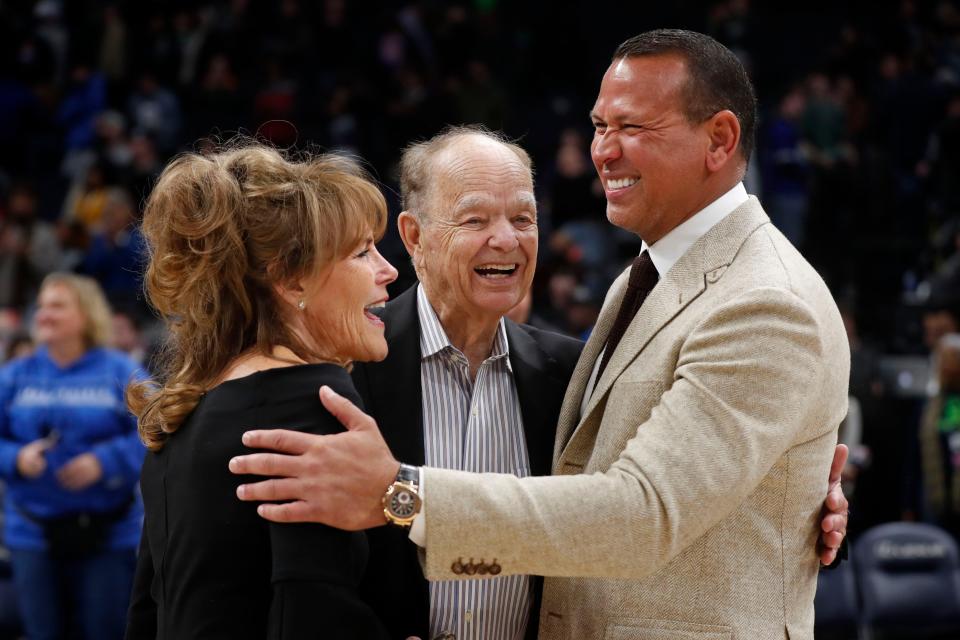Minnesota Timberwolves sale: What we know about Alex Rodriguez and how deal collapsed
Like many courtships, the Glen Taylor-Alex Rodriguez-Marc Lore relationship started great.
In 2021, Taylor agreed to sell the NBA’s Minnesota Timberwolves and WNBA’s Minnesota Lynx to Rodriguez, the former MLB star and now investor, and Lore, the billionaire entrepreneur.
It was a unique arrangement. Rodriguez and Lore planned to buy the team in three installments – 20%, 20% and the another 40% this spring to become majority owners while Taylor helped guide them as owners and stewards of the franchises until the deal was completed.
It was all smiles in the photo opportunities early on with the successful local businessman (Taylor) easing ownership to the younger, cosmopolitan owners.
There are no smiles today. Taylor called off the sale of the remaining 40%, saying in a statement, "the closing was required to occur within 90 days following the exercise notice issued by Lore and Rodriguez. That 90-day period expired on March 27, 2024. Under certain circumstances, the buyer could have been entitled to a limited extension. However, those circumstances did not occur. …
"The Timberwolves and Lynx are no longer for sale."

Rodriguez and Lore, who still own 40% while Taylor and other limited partners own the remaining 60%, are upset.
The timing is terrible as the Timberwolves, who are trying to get the top seed in the Western Conference, are amid their best season in two decades. Meanwhile, a former front-office employee is accused of stealing a hard drive that included personal and professional information from a senior basketball executive’s office.
Here’s what we know about the ownership situation:
What were the terms of the Timberwolves sale agreement?
Taylor, who bought the Timberwolves in 1994 for approximately $94 million, agreed to sell 80% of the Timberwolves and Lynx to Rodriguez and Lore over a three-year period at a $1.5 billion valuation. Taylor and limited partners planned to retain the remaining 20%.
Rodriguez and Lore made the first two payments of 20%, giving them a 40% ownership stake, and said they had the funds for the remaining 40%, which was due March 27.
Why did the Timberwolves sale fall apart?
When major transactions fail, it’s usually because either the buyer or seller (or both) run into issues, and Taylor and the Rodriguez-Lore partnership are at odds.
Rodriguez and Lore missed financial and documentation deadlines repeatedly throughout the process, a person familiar with the deal told USA TODAY Sports. The person requested anonymity because they were not authorized to speak publicly about the situation. Rodriguez and Lore said that is not the case.
It’s clear based on his statement, including his choice not to grant a limited extension, that Taylor grew frustrated with the process. Beyond transactional issues, Taylor didn’t feel Rodriguez and Lore ingratiated themselves to the Taylor family, and more important, to the Timberwolves fanbase.
Rodriguez and Lore built an owners’ suite – they were advised not to – and now as limited partners in a dispute with Taylor, they will no longer have access to that suite nor will they have access to weekly executive management meetings. Rodriguez and Lore say they just wanted to add a modern amenity to the arena.
What are Alex Rodriguez and Marc Lore saying?
In a statement from Rodriguez and Lore Thursday, they claim Taylor has seller’s remorse. Taylor agreed to sell 80% of the team to Rodriguez and Lore at a $1.5 billion valuation. Today, the Timberwolves and Lynx are valued at nearly $3 billion. The insinuation from the Rodriguez-Lore camp: Taylor could make millions more by selling at the higher valuation.
On Thursday, Rodriguez told USA TODAY Sports that due to an NBA agreement he wasn't allowed to talk publicly. But Friday, he went on the offensive.
"It is now personal," Rodriguez told The Athletic. "We can be in this for five years, 10 years, whatever. We’re not going to let go."
Said Lore: "We will use every ounce of effort here to enforce the contract that Glen broke. So that means time, capital, whatever means necessary."
Rodriguez called the complaint about the owners’ suite a cheap shot, disingenuous and disappointing.
What is next between the two sides?
Taylor said the team is no longer for sale, Rodriguez and Lore believe they have met their obligations, triggering an automatic extension and expect attorneys to be involved.
Even if Rodriguez and Lore win in arbitration, they still need approval from NBA owners to purchase the other 40%. There’s no guarantee they will get the approval, especially if Taylor has enough support. It requires 75% of owners to approve a sale of a team.
Plus, the league will take a deep dive into the financing of Rodriguez and Lore to not only ensure funding but also that they can sustain years of losses. It’s not an issue that is going to quietly disappear.
This article originally appeared on USA TODAY: Minnesota Timberwolves sale: How deal with Alex Rodriguez fell apart

